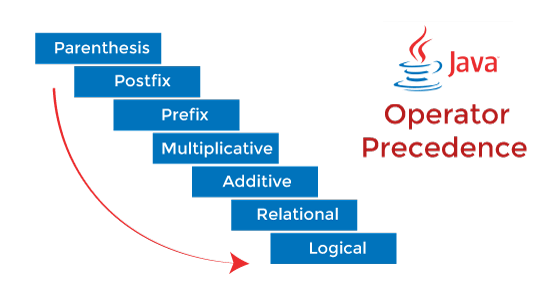Understanding Java Operator Precedence and Associativity
In the world of Java programming, operators play a crucial role in determining the order of operations within an expression. Java has a set of well-defined precedence and associativity rules to help developers understand how expressions are evaluated. In this blog post, we'll dive deep into these rules, helping you gain a solid grasp of how operators work in Java.
Operator Precedence
Operators in Java are ranked by their precedence levels, which dictate the order in which operations are performed within an expression. Operators with higher precedence are evaluated before those with lower precedence. Let's explore the operator precedence hierarchy, listed from highest to lowest:
- Postfix Operators:
expr++,expr-- - Unary Operators:
++expr,--expr,+expr,-expr,~expr,!expr,type(expr) - Multiplicative Operators:
*,/,% - Additive Operators:
+,- - Shift Operators:
<<,>>,>>> - Relational Operators:
<,<=,>,>=,instanceof - Equality Operators:
==,!= - Bitwise AND Operator:
& - Bitwise XOR Operator:
^ - Bitwise OR Operator:
| - Logical AND Operator:
&& - Logical OR Operator:
|| - Conditional (Ternary) Operator:
? : - Assignment Operators:
=,+=,-=,*=,/=,%=,&=,^=,|=,<<=,>>=,>>>=
It's important to note that operators with the same precedence level are evaluated from left to right, except for the right-associative operators:
- Assignment Operators:
=and the compound assignment operators are right-associative. For example,a = b = 5is equivalent toa = (b = 5). - Conditional (Ternary) Operator:
? :is also right-associative.
Overriding Precedence with Parentheses
While operator precedence is essential, you can override it using parentheses (()). Expressions enclosed in parentheses are always evaluated first. For example:
int result = 10 + 2 * 3; // result will be 16 (multiplication has higher precedence) int anotherResult = (10 + 2) * 3; // anotherResult will be 36 (parentheses override precedence) Understanding operator precedence and associativity is crucial for writing correct and efficient Java code. These rules ensure that expressions are evaluated in the intended order, allowing developers to build complex logic with confidence.
In conclusion, Java's operator precedence and associativity rules provide a foundation for understanding how operators interact within expressions. By mastering these rules, you'll be better equipped to write clean, efficient, and error-free Java code.

